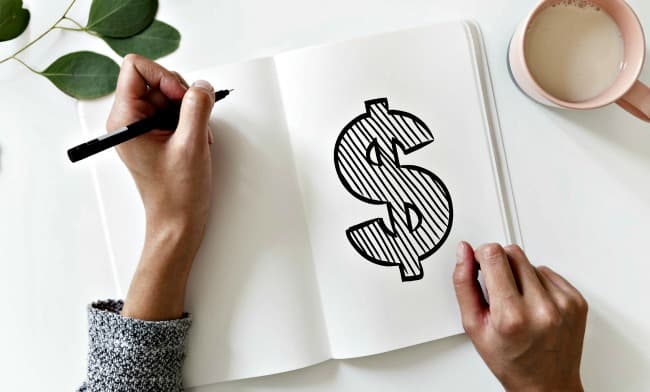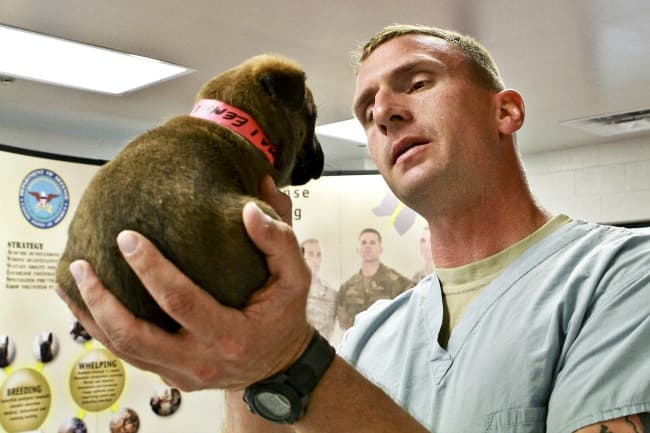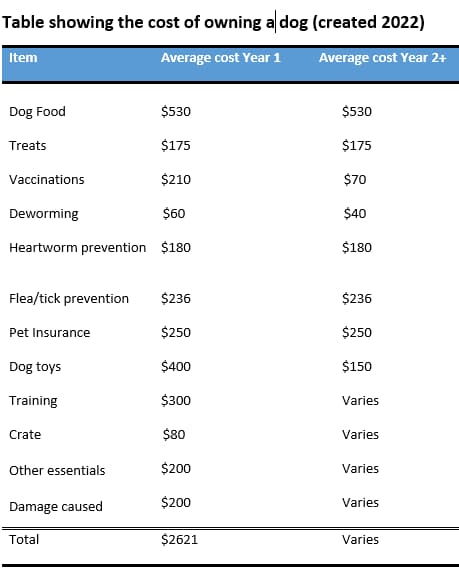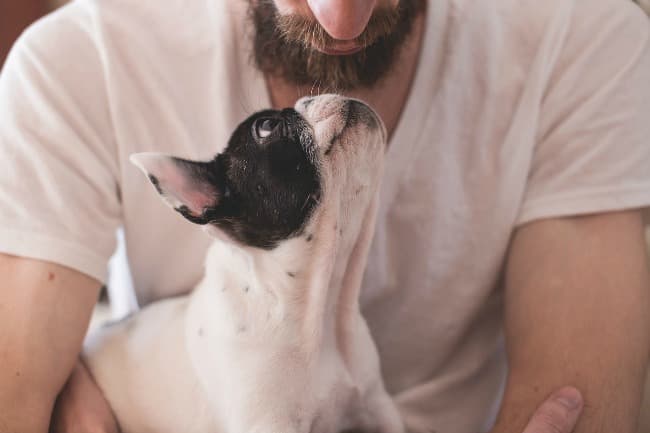FYI: If you buy something through a link on this site I may earn a commission - at NO extra cost to you.
The Cost Of Owning A Dog
The question 'how much does it cost to own a dog', doesn't have a one-size-fits-all answer, because the cost of owning a dog can vary depending on things such as:
- The size of the breed you choose
- Where you get your puppy from
- Where you live
- Your lifestyle and expectations for your dog
- Unexpected situations
However having, at the very least, a big-picture view of what you're getting yourself into is important, because it will help you keep your new best friend healthy and happy, without fraying your nerves!

Why You Need To Be Prepared
Did you know that many puppy owners completely underestimate the cost of dog ownership?
An AKC study from 2004 showed that almost 30% of dog owners said that the costs related to their furry friend exceeded their expectations. In addition, a 2019 survey by credit.com found that the majority of responders underestimated the costs of pet ownership, with only 20% being close, and almost 20% being wrong by as much as 50%!
This can have a long-lasting effect, not just your dog's health and welfare, but also on the relationship between you... and of course on your wallet!
No matter how expensive, or not, your new family member is initially (and first year costs are obviously higher as we're factoring in the cost of your pup/dog, initial equipment and supplies, necessary veterinary care, etc.), it is just a drop in the bucket compared to how much you'll be spending over the next few years.
Your pet is totally dependent on you for everything, and to take care of your pup properly you're going to need to invest a lot of time, patience, love, hard-work... and money.
So, let's take a look at the type of expenses and costs you're likely to see as the proud new owner of a puppy or dog.
What impacts the cost of dog ownership?
Breakdown of annual costs of owning a dog
What Impacts the Cost of Owning A Dog
Of course everyone knows that there will be money to pay out when they first get a dog or puppy.
There's the initial cost of the pup, basic supplies such as a collar and toys, and 'consumables' like dog food, treats etc. Surely those can't cost too much, right? Wrong.
A recent survey undertaken by the American Pet Products Assoc., into the cost of pet ownership in the USA found that, in 2020, Americans spent $103.6 BILLION on their furry friends, with that figure expected to rise by around $6 billion in 2021.
In 2012 pet owners spent just over $53 billion, so costs have almost doubled in ten years. Pet ownership is big business.
Of course, you're looking at cats, small pets, birds, fish etc. in those figures too, but with almost 40% of US homes containing at least one dog, a lot of those dollars are dog-related.
Veterinary Care
Veterinary care is a big expense that is often overlooked, or underestimated, but surveys indicate it accounts for over 30% of the total costs of pet ownership.
When you're considering the cost of owning a dog it vitally important to factor in routine health care, and also to allow for unexpected medical expenses. Over their lifetime every dog will need treatment for some kind of medical issue, and those who develop chronic conditions or have an emergency will be expensive.

Puppies need several sets of vaccinations (and adult dogs need annual 'boosters'), they also need regular and ongoing preventative treatment for parasites such as canine worms and fleas/ticks.
And of course, spaying or neutering is likely to be a necessary expense if you've bought a puppy, or an un-altered adult dog.
The APPA (whose figures I've used above) estimate that for dogs, vaccines and check-up visits alone cost an average of just under $250 per year., and additional surgical visits a little over $450.
No matter how careful you are, accidents and illnesses can (and do) happen, and if your pup falls seriously ill, has an accident, develops a chronic condition or needs surgery, then the costs can be substantial!
Pet health insurance can take care of many major veterinary bills, Although there's a monthly premium to be paid this is often the best way to be prepared for veterinary costs, especially the unexpected/emergency kind.
An alternative is to put aside a certain amount every month for veterinary expenses, it just may save you from having to make a life-or-death decision based on $$$'s.
Feeding Your Dog
Dog food and treats account for a whopping 44% of dog ownership costs. That's a LOT of money.
Your dog is going to eat a LOT of dog food over his lifetime, and making sure he gets a good quality puppy food or dog food is hugely important to both his health, and his longevity.
A poor diet can lead to all sorts of issues including growth/developmental problems, skin irritations, dog food allergies, digestive upsets and more.
Premium food is essential, but it isn't cheap!
Other alternatives include feeding your dog a raw diet, or preparing homemade dog food. Both can be great options when done right,
Essential Pet Supplies
While surveys like the APPA might suggest this category will cost you around $100 per year, anyone who's ever bought dog toys, beds, leashes, collars, crates, pee pads... and all the million and one other things a dog needs will know this is far, very far, from reality.
The pet supply industry is booming, and the selection of beds, toys, collars and ID tags, treats, clothes, accessories and so on is HUGE.
It's frighteningly easy to spend a lot more money that you expected to on 'extras', and even the essentials don't last forever.
For example, the crate you buy for an 8 week old puppy is going to need to be replaced regularly as he grows. Unless you buy a wire crate with a divider (and even then, this isn't going to work if the 15lb puppy you now own is going to weigh north of 100lbs fully grown!)
Even if you stick to the essentials, there are a lot of those too, including:
- A crate or puppy training pads
- Dog Urine Cleaning products
- Toys for teething puppies
- Toys for big pups, adult dogs and power chewers
- Training equipment & classes
- Grooming supplies
..... the list goes on and on.
How much you pay for your pet
Whether you're paying $2000+ for a show-quality purebred puppy, $75 or $100 for a pound/shelter dog, or zero dollars for a pup from the neighbor all affect the bottom line for those first year costs.
Wherever you fall on this scale, I can promise you that there is no such thing as a FREE puppy!
Even if you don't have to pay to take your new pet home, the bills will soon be piling up because there's always a cost of owning a dog - even if it's deferred.
Your puppy/dogs age, size, breed & general health
All of these factors play a big role.
Obviously the younger the pup, the longer you can expect him/her to be a part of your family, and that means higher cost of dog ownership overall.
Smaller breeds tend to live longer than the large or giant breeds, and a little dog may live on average for 13 - 15 years, where an X-Large or giant breed may only live for 7 - 9 years.
Some breeds are more prone to health problems than others (a mixed breed pup is likely to be the healthiest choice in this respect), and although all purebreds have breed-specific weaknesses some are likely to be more costly - or show up more frequently - than others.
So, it pays to research dog breeds and choose wisely.
Also, the cost of owning a dog is higher with large and giant breeds.
Big dogs more to raise than small ones because they need more (or the Large or X-Large size) of, everything - and there can be a huge difference in price when that happens.
However, there is a flip-side to this too.
Large and giant breed dogs tend to have a shorter lifespan than smaller ones, so the expenses are higher per year, but the number of those years are likely to be less.
But, of course, this isn't set in stone! I had two Rottweiler girls, one lived to be twelve years old, the other thirteen. Well beyond their expected lifespan, most likely due to good genetics, diet and health care.
Extra-tiny or 'teacup' sized breeds can suffer from more health problems than their moderately sized cousins because of their unnaturally tiny size and frailty.
If you choose a long-haired breed then you can expect to be spending extra money on grooming tools and accessories, and probably trips to the doggie spa or salon too.

Choosing a healthy puppy in the first place can save you money in the long run because you're less likely to run into health problems right off the bat.
If you're choosing a purebred dog, buying from a responsible breeder increases your chances of getting a pup who is free from hereditary diseases (providing the parent dogs are appropriately tested for breed-specific conditions) and who has been well taken care of.
Also a pup whose been properly cared for before you bring him home is likely to have had at least some vaccinations and parasite prevention, have been fed a quality diet and kept away from possible contagious diseases. This is a big plus too.
Buying from a back-yard-type breeder increases your chances of getting a dog who has isn't genetically sound and likely hasn't received the best diet or veterinary care early on. These dogs may end up being sickly for a number of reasons, sometimes chronically so, leading to a lifetime of vet bills.
If you adopt a puppy or dog from a rescue organization or animal welfare organization he will likely have had all his age-appropriate vaccinations, deworming, health checks and also have been spayed or neutered. This reduces your costs, means you're likely getting a healthy pet, and also helps an animal who is in need of a loving home.
Your lifestyle, expectations, plans and budget
The cost of owning a dog who's going to be a working pet, or compete in shows or sports, are above average because of the extra expenses involved. Equipment, travel, time, training.... it all adds up.
If you travel a lot and can't or won't be taking your dog along with you then there will be bills for boarding or pet-sitters.
If you want your little guy to spend a couple of days a week (or more) at Doggie Daycare that's going to cost money. Likewise if you need a pet sitter or dog walker because you work long hours.
If you want to go above and beyond average, when it comes to food, toys, treats, accessories etc. then you can spoil your new pup to your hearts content - but it will be pricey :)
Where you live
Yes, that's right... your location could have a significant impact on the cost of owning a dog.
Just as the cost of living for people varies from state to state (and from country to country) so does the cost of dog ownership.
Veterinary costs are often affected the most, but general pet supplies can also cost more in some areas. In the USA for example, it could cost someone living in New York three times as much to raise their dog as it might cost me in the rural 'heartlands'.
Parasite prevention is also more costly in some areas than others. Arid, dry climates don't have as many mosquitoes, ticks or fleas as the warmer, wetter areas. Northern states have shorter summers and therefore less time for insects.
Some parts of the country have bodies of water where Giardia is more likely to occur, if you live in a tick-infested area then Lyme Disease vaccinations may be recommended.
The Annual Cost of Owning A Dog
There's no one-size-fits-all formula for working out the cost of dog ownership because there are just so many things that affect the numbers, but it's a subject that has been looked at closely.
Although there's no single figure I can give that will tell you the exact cost of owning a dog, using research done by the ASPCA, AKC, APPA and other leading pet organizations, and relying on decades of personal experience of raising and caring for dogs, I've came up with some figures that will give you an APPROXIMATE idea of how much that new pup might cost you over his lifetime.
Bear in mind that these are averages and so your costs might be higher, or lower.
I've based these on a mid-sized dog who lives for 12 years. As with everything else, there is no AVERAGE dog - each one is different and these figures are for guidance only :)
 Bear in mind that these are averages and so your costs might be higher, or lower.
Bear in mind that these are averages and so your costs might be higher, or lower.Then there are some additional extras which most owners will use/need at some point. These include:
- Grooming - $175 - $400 per year
- Boarding - $350-$450 for the average 10 - 14 day vacation
- Puppy Training Pads - $400+
In the above figures I haven't accounted for emergencies or chronic health problems.
The table and costs above give average costs for one year, so if you feel ambitious and want to do the math to work out what the total would be over a ten year life span (and fill in figures for the variables depending on your dog's statistics) it should give you at least a ball-park figure of what he is going to cost you.
Final Thoughts
This page is all about the cost of dog ownership - in dollars and cents, and I think it's very important that every potential new dog owner realizes what sort of financial costs they're looking at.

But of course, you're not going to be shelling out thousands of dollars from day one, it builds up over time, month after month, year after year.
The totals look frightening (and you need to be prepared for this amount to be spent, most likely more than that actually) but it's a kind of drip-drip-drip expense, not a one-off event.
Dogs are NOT inexpensive to keep properly, but they repay us in so many ways that to me they're actually priceless.
It's said that 'you can't buy love', but when it comes to dogs I don't think it's true because your dog gives you unconditional love for his entire lifetime!
And he throws in a whole lot of loyalty, friendship, comfort and enjoyment as well.
Personally, although the cost of owning a dog may be significant, I still think it's a great deal :)
you might also like...
- Home
- Choosing A Puppy
- Cost of Dog Ownership
FTC Disclosure: Some pages on this site contain affiliate links. I may earn on qualified purchases.





